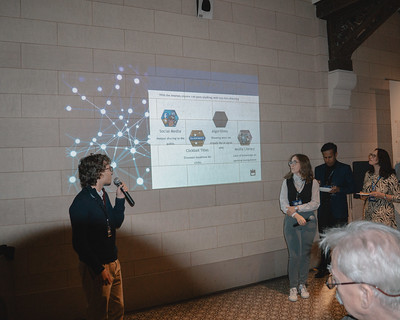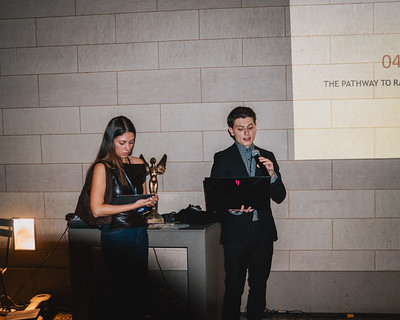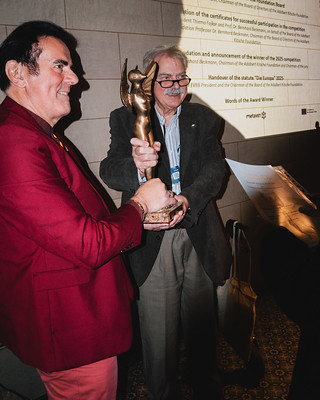Brussels, October 2, 2025
The EVBB Annual Conference 2025 opened in Brussels under the theme “Innovative Financial Models for the Future of VET.” The event began on an inspiring note with the presentation of the prestigious Die Europa Prize, underscoring that the future of skills development is not merely about funding, but about funding with purpose.
The Die Europa Prize: Celebrating VET’s Social Conscience
More than an institutional accolade, the Die Europa Prize is a tribute to the humanitarian heart of vocational education and training (VET). Awarded by the Adalbert Kitsche Foundation in collaboration with the EVBB, it honors outstanding educational initiatives that promote inclusion, peace, and unity, particularly those empowering disadvantaged groups and recognized refugees.
This year’s ceremony took place amid vibrant discussions on Public-Private Partnerships and EU funding frameworks, reinforcing the critical link between financial innovation and social equity. Collectively, the nominated projects represented over €1.47 million in EU-funded initiatives, highlighting the powerful social mission driving VET across Europe.
The Winner: MothersCan — A Blueprint for Economic Resilience
The 2025 Die Europa Prize was awarded to “Bringing Mothers Back to Work – MothersCan,” an Erasmus+ Cooperation Partnership in Adult Education that exemplifies how targeted investment in skills can transform lives.

The Challenge
Single mothers across Europe face systemic barriers to employment and vocational training, chief among them, the lack of flexible learning opportunities and affordable childcare. These constraints often lead to long-term unemployment and economic vulnerability.
The Innovation
MothersCan tackled this head-on by designing flexible, supportive vocational pathways tailored to single mothers. The program offers skill development aligned with sustainable employment opportunities, all while accommodating caregiving responsibilities.
The Impact
Coordinated by Plan B gemeinnützige Gesellschaft für berufliche Bildung mbH (Germany) with partners in Spain, Greece, Cyprus, Romania, and Belgium, MothersCan has proven that socially responsible VET investment can be a powerful engine of mobility, transforming welfare dependency into economic participation and strengthening communities across Europe.

Champions of Inclusive VET
Competition for this year’s prize was exceptional, with all seven nominated projects advancing the social mission of VET through two core priorities:
1. Systemic Safety and Quality Assurance
- END GBV in VET: Funded under the CERV-DAPHNE call (budget exceeding €600,000), this project tackles gender-based violence (GBV) within VET institutions. Through capacity building and awareness campaigns, it aims to create safe, equitable learning environments for all learners.
- EQAVET for Inclusion and Prevention of Dropout in Vocational Education: An Erasmus+ project focused on embedding inclusivity into quality assurance systems. By applying EQAVET tools, it identifies and mitigates early school leaving, supporting vulnerable learners, including those in Ukraine and Moldova.
- SafeSpaces: This initiative, funded by the European Education and Culture Executive Agency (EACEA), works with partners like the EVBB and YEU (Youth for Exchange and Understanding) to create secure and supportive environments. While not explicitly focusing on disadvantaged groups in the submitted description, its mission to foster safe spaces is foundational to all successful, inclusive VET provisions.
2. Targeted Economic and Social Remobilization
- Coaching towards employment – O2R Project (Offer of Identification and Remobilization): A French national initiative specializing in coaching and remobilization strategies. The project supports individuals facing deep social or professional exclusion—helping them reconnect with education and transition into sustainable employment.
- TourEdu4All: A holistic model to open Tourism VET for vulnerable groups: Funded through Erasmus+ Capacity Building in VET, this project provides a clear example of sectoral inclusivity. It is dedicated to designing a comprehensive model to open up the tourism and hospitality sector—a major global employer—to vulnerable groups. The project maintains a strong public presence, including an active website and social media channels, and has already presented its model at high-profile events like the EVBB VET House Launch in Brussels.
- TE VAIETE: This initiative, funded by the French Polynesian government, highlights the global reach of VET innovation. While focused on a specific region, its emphasis on a strategic communication plan, media relations, and Corporate Social Responsibility (CSR) conferences demonstrates a commitment to integrating VET projects within the broader social and economic narrative, a core theme of the EVBB conference.

A Defining Moment for Inclusive VET
The Die Europa Prize 2025 ceremony provided a fitting and uplifting conclusion to the EVBB Annual Conference. It reaffirmed a central truth: innovative financing must always serve the highest goals of VET: social inclusion, peace, and cohesion.
MothersCan now stands as a model of what is possible when financial innovation meets compassion, proving that every euro invested in inclusion yields exponential returns for individuals, families, and Europe’s collective future.

